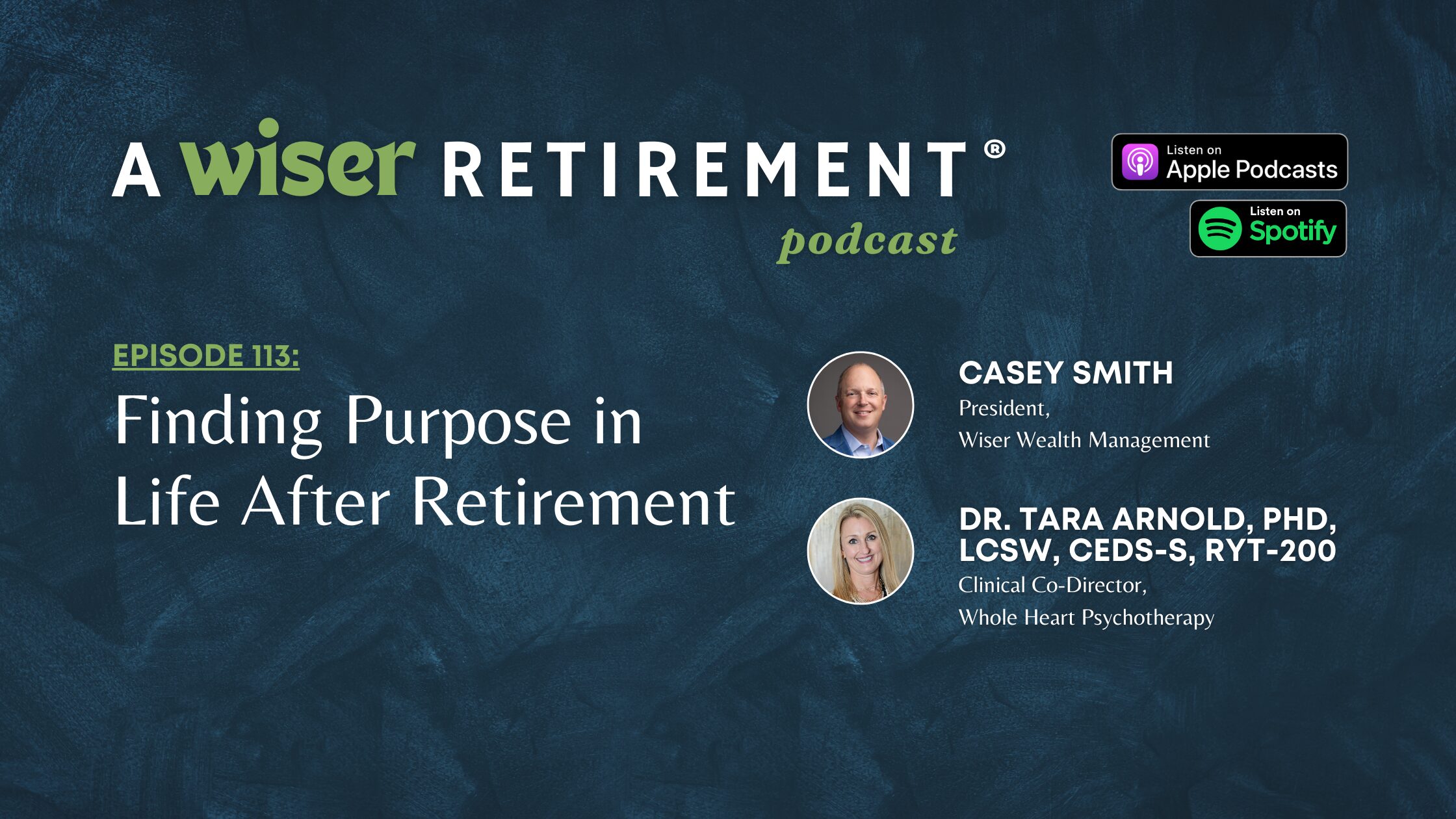
Finding Purpose in Life After Retirement
In this episode of A Wiser Retirement® Podcast, Casey Smith, President of Wiser Wealth Management, welcomes special guest Dr. Tara Arnold, PhD, LCSW, CEDS-S, RYT-200, Clinical Co-Director of WholeHeart Psychotherapy. Dr. Arnold shares insights on finding purpose after retirement and navigating emotional wellness during this major life transition. The conversation explores marriage in retirement, recognizing signs of depression, and practicing mindfulness. She also offers strategies for managing anxiety and depression. Building a strong psychological retirement portfolio, she explains, is just as important as your financial one.
Listen or Watch:
Summary:
Building a Psychological Retirement Portfolio
Many people assume retirement will be easy, but the transition often proves more complex. Planning for retirement isn’t just about finances—it also requires emotional preparation. Building a psychological retirement portfolio can help you navigate the emotional changes and redefine your identity. Start by identifying your hobbies, passions, relationships, and financial boundaries to create a fulfilling and balanced lifestyle.
Marriage in Retirement
Retirement offers a unique opportunity to strengthen and redefine your relationship with your spouse. With more time together, it’s important to set clear expectations and boundaries. Start discussing your hopes, routines, and individual needs early on. Open communication and honesty are key to building a retirement lifestyle that supports both partners’ happiness.
The Sugar Rush Effect
In the early stages of retirement, many experience a “sugar rush”—a burst of joy from newfound freedom and leisure. Travel, hobbies, and relaxation are exciting at first, but the initial thrill can wear off, sometimes leading to feelings of emptiness. To avoid this emotional dip, plan ahead for how you’ll stay engaged and fulfilled over the long term.
Recognizing Signs of Depression
Depression in retirement is more common than many realize. Warning signs include losing interest in activities once enjoyed, withdrawing socially, excessive worrying, and persistent negative thoughts. One way to combat these feelings is to shift your mindset: focus on what retirement offers rather than what it takes away. Creating a new sense of purpose is essential for emotional well-being.
Finding Purpose in Retirement
Discovering what brings you joy is key to building a meaningful retirement. Ask yourself: What matters to me? What do I enjoy? Your answers can help guide your next steps—whether that’s volunteering, mentoring, starting a small business, or joining local groups. Establish a routine that includes self-care, physical activity, and time for meaningful pursuits to create a sense of daily purpose.
Setting Healthy Boundaries
Being there for family is important, but so is maintaining your own well-being. Set healthy boundaries by communicating openly with loved ones about your needs, availability, and expectations. This helps foster mutual respect and prevents burnout or resentment.
Practicing Mindfulness
Retirement brings emotional highs and lows. Practicing mindfulness can help you stay grounded. Choose your activities intentionally, remain socially and physically active, and explore new interests. Talking to others or seeking guidance from a counselor can also help you discover what brings you joy and fulfillment.
Managing Depression and Anxiety
If you’re dealing with depression or anxiety, explore techniques that support mental health. Meditation, deep breathing, regular exercise, gratitude journaling, and engaging in enjoyable activities can all make a meaningful difference. Consistently practicing these habits can improve your mood, outlook, and overall well-being.
- Schedule a Complimentary Consultation: Discover how our services can help you achieve financial confidence.
- Access Our Free Guides: Gain valuable insights on topics such as why most financial plans fail, how to leave a financial legacy, post-divorce financial planning, and more!
- Subscribe to A Wiser Retirement® YouTube Channel.
- Listen to A Wiser Retirement® Podcast and access previous episodes.
Share This Story, Choose Your Platform!
Wiser Wealth Management, Inc (“Wiser Wealth”) is a registered investment adviser with the U.S. Securities and Exchange Commission (SEC). As a registered investment adviser, Wiser Wealth and its employees are subject to various rules, filings, and requirements. You can visit the SEC’s website here to obtain further information on our firm or investment adviser’s registration.
Wiser Wealth’s website provides general information regarding our business along with access to additional investment related information, various financial calculators, and external / third party links. Material presented on this website is believed to be from reliable sources and is meant for informational purposes only. Wiser Wealth does not endorse or accept responsibility for the content of any third-party website and is not affiliated with any third-party website or social media page. Wiser Wealth does not expressly or implicitly adopt or endorse any of the expressions, opinions or content posted by third party websites or on social media pages. While Wiser Wealth uses reasonable efforts to obtain information from sources it believes to be reliable, we make no representation that the information or opinions contained in our publications are accurate, reliable, or complete.
To the extent that you utilize any financial calculators or links in our website, you acknowledge and understand that the information provided to you should not be construed as personal investment advice from Wiser Wealth or any of its investment professionals. Advice provided by Wiser Wealth is given only within the context of our contractual agreement with the client. Wiser Wealth does not offer legal, accounting or tax advice. Consult your own attorney, accountant, and other professionals for these services.





